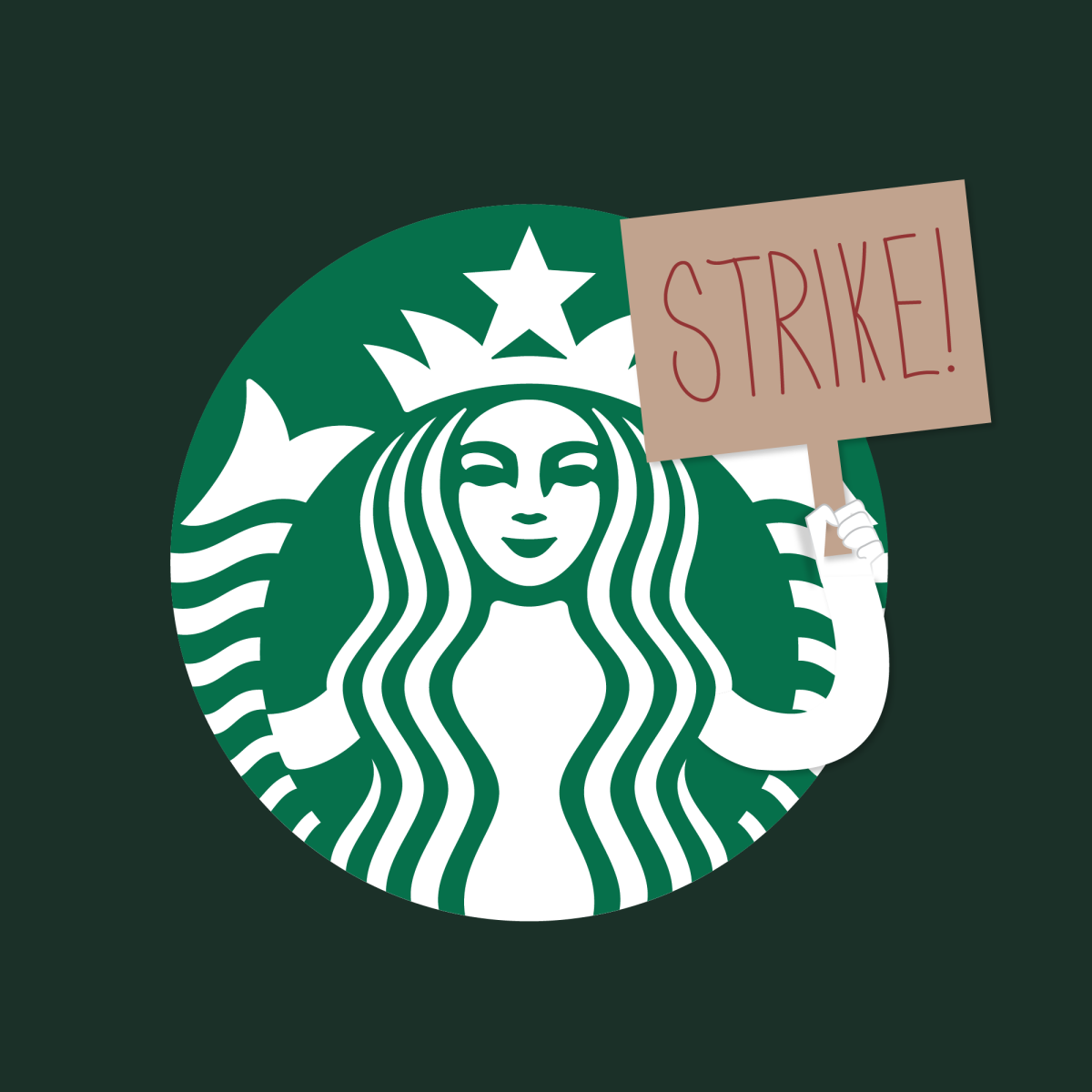Many students depend on their morning cups of coffee to get through class, but it may be at the expense of their peers.
Texas A&M currently has four Starbucks locations on campus, including the Sterling C. Evans Library, the Corps of Cadets Quad, Hullabaloo Residence Hall and the Zachry Engineering Complex, mostly staffed by current students. The national Chartwells Higher Ed dining company oversees and manages all food locations on campus in contract with A&M.
Former on-campus Starbucks employee and communication junior Ashley Dean, who worked for the Chartwells company for seven months, said she began to notice problems with the equipment and felt pressured to continue serving under poor conditions.
“The Starbucks I worked for was an older Starbucks, with old appliances [and] ovens not working,” Dean said. “Our drains … flooded and we [had] to close the store. Right when the drains started working, we had to reopen the store, and the drains still smelled in the back. We still had to serve people coffee under these conditions.”
Dean said she found the conditions unfair to the staff. During her time working on campus, Dean said she was moved to multiple locations and forced to work under the pressure of the popular coffee chain being understaffed.
“It really just changes a person’s point of view on how each Starbucks is run,” Dean said. “If you talk to anyone from any other location [on campus], they would feel the same way.”
Dean said that even when closing time was approaching, workers were often forced to continue to take orders and serve customers in addition to staying after to clean the store.
“[There would] be 30 customers, and we would still be serving drinks at 10:30 [p.m.],” Dean said. “Then, after the last customer comes in, we would have to start cleaning the store. We only get an hour or two to start cleaning and start prepping for the morning crew, and we just didn’t have enough time for that. We did as much as we could.”
Biomedical sciences senior Annette Haynes said she witnessed poor equipment maintenance and poor management during her time working at the coffee franchise on campus.
“During the COVID[-19] semester, where we all came back on campus, a lot of us just started to get really fed up with the job,” Haynes said. “We felt like we were doing too much for too little pay. We all started organizing a walkout, but we never really wanted to go through with it. I guess we were too scared.”
After Haynes’ manager put in her two weeks’ notice, she and fellow coworkers decided to quit as well.
“[The person over her] basically said, ‘Instead of two weeks, let’s make it one day,’” Haynes said. “The rest of us were like, ‘Well, if you’re not going to be here, then we don’t really want to have another manager.’ So we all decided to walk out. But, it was also [the] bad working conditions as well.”
Khloris Parenti, Class of 2021, said on-campus Starbucks employees are trained and certified as baristas, which results in an increase in pay. On average, the national salary of baristas is $12.16 an hour in exchange for taking orders, making coffee, tea and other drinks and operating cash registers and credit card machines. Parenti said they, and other coworkers, were labeled as “general food service workers” but were expected to complete the same tasks as a barista without the same pay.
“That was made worse when they started trying to get around to hiring people,” Parenti said. “They did not get a ton of trust at first, so they increased the starting pay, but they didn’t increase [the] current pay. They were giving new hires pay higher than the people who had been working there for … over a year who should have already had their hourly rate increased.”
Throughout the summer of 2021, Parenti said Starbucks employees were required to complete daily COVID-19 screenings and record them.
“I forgot to write in that booklet for a couple of days and thought about it and realized I was usually only one of the few people actually touching that book,” Parenti said. “[I] decided to just stop putting anything in it and see if anyone said anything. It felt like it was something that they had decided to do so that they could say that they were doing something, and then nobody was actually there to make sure that it had been done.”
During Parenti’s time working at Starbucks, they also said they noticed a coworker sneezing in cups.
“It happened a couple of times,” Parenti said. “Twice that I saw, he was making drinks on our hot bar and then sneezed without turning his face or covering [it] over the cups and then continued to make those drinks.”
After tweeting about their experience, Parenti said they were put on “administrative suspension” and eventually fired for “maliciously false statements.”
“I guess it got picked up in some sort of alert that they had for mentions of the company on Twitter,” Parenti said. “I got put on administrative suspension or something along those lines, and maybe a week after that, after they had asked me to write statements about why I had said that and [claiming] that I had deleted the tweets, they called me to set up a meeting where they told me that I had been terminated and then sent me a termination letter.”
Despite the information in the tweet, Parenti said they never saw any indication that his coworker was fired for his actions sneezing in cups.
“It pointed to their priorities,” Parenti said. “The thing that they fired me for was hurting their bottom line [of] perception.”
Human Resources Manager Natalie Drew said there was one student associate complaint brought to her attention in the first week of September about COVID-19 at a Starbucks location.
“While they didn’t bring it directly to our attention, we did see it on social media and followed up,” Drew said. “While all internal employee relations matters are confidential, I can assure you that this matter was fully investigated and handled in accordance with all company policies and procedures.”
Director of Marketing & Guest Experience Stephanie Denson said student associates are a key part of the Chartwells team and are afforded the same protections as all associates and covered by state and federal protections.
“We encourage anyone that works in [Facilities and Dining] and has concerns to discuss directly with one’s manager or supervisor,” Denson said. “We also have a confidential associate hotline for any concerns one may have about treatment or workplace safety if they don’t feel comfortable speaking with their direct manager.
“The SpeakUp service is covered during on-boarding and also readily available and posted at all time clocks,” Denson said. “Former employees can use the number as well. This is important, because we can’t resolve issues or concerns that aren’t brought to our attention. Every claim is thoroughly investigated by our HR team, and we can confirm that any complaint regarding working conditions or management brought forth this semester at Starbucks has not been substantiated.”
Denson said despite nation-wide labor challenges, Chartwells was prepared for the semester with early recruiting and was able to open at the same staffing levels as in 2019, pre-COVID-19. Chartwells schedules at the recommended number of employees from Starbucks, but more frequently schedules over that recommendation, Denson said. However, unexpected call-outs do happen and it can make a shift more challenging than it would have been otherwise.
“Regarding Dining’s COVID[-19] precautions, you may have noticed that those serving on campus are required to wear masks when working in our locations and have been all semester,” Denson said. “Additionally, we screen for COVID[-19] every time someone punches in for their shift, asking about symptoms or exposure directly on the time clock. These questions must be answered as part of the clock-in process, and we track the results. If anyone is exhibiting symptoms, answers the screening questions in the affirmative or notifies us of exposure, we follow the university’s protocol around reporting and quarantine.”
If any employees have prior or existing concerns, Denson encourages them to reach out at 1-800-498-2954 and www.letintegritybeyourguide.com/speakup if they feel their concern hasn’t been addressed as this is the proper channel.
Parenti said they believe Chartwells’ priorities lie in how it is perceived.
“What they seem to respond to the most is perception, changes in perception,” Parenti said. ”I think just pointing at it, and putting pressure on them to change things would be a large help in and of itself. A lot of the issues that Chartwells has had at A&M persist because they’re allowed to be ignored. There’s a certain level of immunity through ignorance.”









